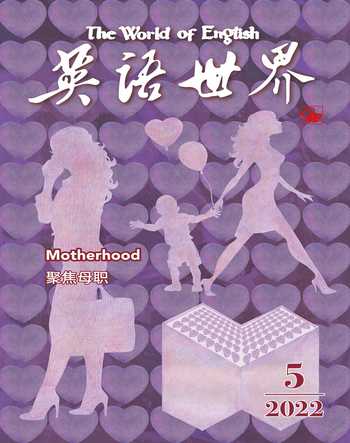Matrescence: The Developmental Transition to Motherhood孕乳期:转变为母亲的过程
亚历山德拉·萨克斯 苏扬
A body, mind and hormone shift that sounds like “adolescence”.
堪比“青春期”的生理、心理和荷爾蒙之变。
Though many of us have tried to block it out, we all remember puberty. First came the pimples and stretch marks. And next, feeling euphoric, awkward, and disoriented about growing from one life stage to the next.
Science and culture keep us well informed about the physical and psychological changes adolescents experience in their bodies, hormones, relationships, and identities. But women also go through a radical transformation in each of these dimensions when they are having a baby.
My work on the developmental transition to motherhood explores “matrescence,” a term coined in 1973 by Dana Raphael, a medical anthropologist who also popularized the phrase “doula1.” Over the decades, other academics and clinicians have expanded on her research, but Ive noticed that the term is not yet “out there” in popular culture and conversation. Im a reproductive psychiatrist who works with pregnant and postpartum women, and my work and this blog are motivated by the mission to change that.
Over the past decade that Ive been working in this field, Ive observed a pattern. Women regularly call me to ask if they have Postpartum Depression. Though they may not meet diagnostic criteria for this condition, Postpartum Depression seems to be the most familiar term they have on hand to frame2 their distress. Heres what many of them describe: “I love my baby but I dont have the right maternal instincts” and “Im not enjoying this, mostly I feel tired” and “I feel so guilty because I wanted a baby more than anything, but sometimes I find myself feeling bored and even resentful.”
These descriptions of discomfort are natural to matrescence, and not diagnostic of any specific disease. Its no coincidence that matrescence sounds like adolescence. Both are times when body morphing and hormone shifting lead to an upheaval in how a person feels emotionally, and how they fit into the world. And like adolescence, matrescence is not a disease, but since its not in the familiar medical vocabulary, its being confused with a serious condition (that deserves its own expanded outreach, research, and advocacy) called Postpartum Depression. (More recently, Postpartum Depression clinical terminology is expanding to the more inclusive: “Perinatal Mood and Anxiety Disorders,” PMADs.)
There is so much love in matrescence. The bonding hormone oxytocin circulates through your body, and you become attached to your baby at the most basic cellular level. But, because youre still human, your brain and body continue to send you the usual cues to take care of yourself: to sleep, to eat, to go to the bathroom. Not to mention to exercise, have sex, socialize, continue your professional, spiritual and intellectual life, and nurture your relationship. Many new moms find themselves feeling like they are in a push and pull, an emotional tug of war, as they try to figure out how to care for themselves and their babys needs at the same time.
Many people find early motherhood to be both pleasurable as well as challenging, and at times fear and anger-inducing, and this is mediated by psychological as well as physiological factors (ranging from hormonal shifts to sleep deprivation.)
Rather than feeling like something is “wrong with them,” lets encourage mothers to speak more openly with each other so that the beautifully messy challenges and joys of matrescence are as accepted in our culture as the ups and downs of adolescence. My hope is that if more women understood the natural progression of matrescence, they might feel less alone, they might feel less stigmatized, and this might even reduce rates of postpartum depression.
青春發育期尽管有许多人曾努力要从记忆中抹去,但我们谁也不会忘记:先是长出痘痘和膨胀纹,然后是对生命从一个阶段进入下一个阶段感到兴奋、别扭和迷茫。
关于青少年在身体、荷尔蒙、两性关系和身份认同等方面经历的生理和心理变化,科学和文化给了我们足够知识。而女性在孕育宝宝的过程中,上述诸方面也要经历一次巨变。
我对为人母这一过渡期的研究着力于“孕乳期”。这个词是医学人类学者达娜·拉斐尔1973年提出,她还普及了“导乐”一词。数十年来,其他学者和临床医生在她所做研究的基础上有所拓展,但我发现,大众文化和交流中,孕乳期这个词有待普及。我是产科精神病医生,接诊对象是孕期和产后妇女。我之所以从事这项研究以及写这篇博文,初衷就是要担负起改变这一现状的使命。
入行十年,我发现一个规律:女性朋友们给我打电话,经常问的是,她们是否患上了产后抑郁症。她们可能没有达到产后抑郁的诊断标准,但她们似乎却能随手拿这个词定义自己的痛苦。许多人的描述如下:“我爱宝宝,可就是没有做母亲的天性”“喜欢不起来,经常累得慌”“我很内疚,之前一心一意想要宝宝,现在有时却感觉无聊甚至火大。”
这些痛苦的表现在孕乳期很正常,不是任何病症的反应。孕乳期的种种听起来与青春期相似,这不是巧合。两者都是体形和激素变化导致情绪和适应外界的方式出现大幅波动的阶段。与青春期一样,孕乳期的表现也不是病;因不属于常见医学词汇,人们把它误作一种严重疾病(这又值得另外拓展探索、研究和宣传)——“产后抑郁症”。(近期,产后抑郁症的临床扩展到一个更大的范围,称为“围产期情绪和焦虑障碍”)。
孕乳期充满着爱:这个阶段,被称为“连接激素”的催产素在体内涌动,母亲对婴儿的依恋达到最基本的细胞级。但是,人终究是人,大脑和身体仍如常发出“自护”信号:睡觉、吃饭、如厕,此外还有锻炼、性爱、社交,维持职业、精神及智力生活,维护夫妻感情。许多新妈妈感到自己在拔河,在进行一场情绪拔河,需要不断琢磨怎么既照顾好自己,又照顾好宝宝。
许多人发现刚刚当妈妈时苦乐参半,不时还有恐惧和恼火,这些波动有心理因素也有生理因素(从荷尔蒙变化到睡眠不足)。
不要觉得“她们有点不对劲”,而要鼓励妈妈们更坦诚地交流,把孕乳期那些纠缠不清的苦乐,像青春期的起起伏伏一样,变成我们文化的一部分。我的希望是,倘有更多女性了解孕乳期的这一自然过程,她们就能少一点孤立无援,少受一点指责,兴许,还会降低产后抑郁率。
1 doula(虽未接受专业训练,但是在婴儿出生过程中以及之后承担照料产妇工作的女性)导乐,助产士。
2 frame(措辞谨慎地)表达,说出。

